Java图形界面工具类Swing程序界面设计相关实战内容
2021-07-30 11:56:29
浏览数 (3560)
Swing 是基于 AWT,用于开发 Java 应用程序用户界面的工具包,相较于 AWT 类而言,Swing 的内容更加的丰富。下面,我使用 Swing 工具包中的组件,来实现简单的 Java 程序界面的简单设计。
一、按钮组件
1.1 提交按钮组件
package swing;
import java.awt.*;
import java.awt.event.*;
import java.net.*;
import javax.swing.*;
public class JButtonTest extends JFrame {
/**
*
*/
private static final long serialVersionUID = 1L;
public JButtonTest() {
URL url = JButtonTest.class.getResource("imageButton.jpg");
Icon icon = new ImageIcon(url);
setLayout(new GridLayout(3, 2, 5, 5)); // 设置网格布局管理器
Container c = getContentPane(); // 创建容器
for (int i = 0; i < 5; i++) {
// 创建按钮,同时设置按钮文字与图标
JButton J = new JButton("button" + i, icon);
c.add(J); // 在容器中添加按钮
if (i % 2 == 0) {
J.setEnabled(false); // 设置其中一些按钮不可用
}
}
JButton jb = new JButton(); // 实例化一个没有文字与图片的按钮
jb.setMaximumSize(new Dimension(90, 30)); // 设置按钮与图片相同大小
jb.setIcon(icon); // 为按钮设置图标
jb.setHideActionText(true);
jb.setToolTipText("图片按钮"); // 设置按钮提示为文字
jb.setBorderPainted(false); // 设置按钮边界不显示
jb.addActionListener(new ActionListener() { // 为按钮添加监听事件
public void actionPerformed(ActionEvent e) {
// 弹出确认对话框
JOptionPane.showMessageDialog(null, "弹出对话框");
}
});
c.add(jb); // 将按钮添加到容器中
setTitle("创建带文字与图片的按钮");
setSize(350, 150);
setVisible(true);
setDefaultCloseOperation(WindowConstants.DISPOSE_ON_CLOSE);
}
public static void main(String args[]) {
new JButtonTest();
}
}
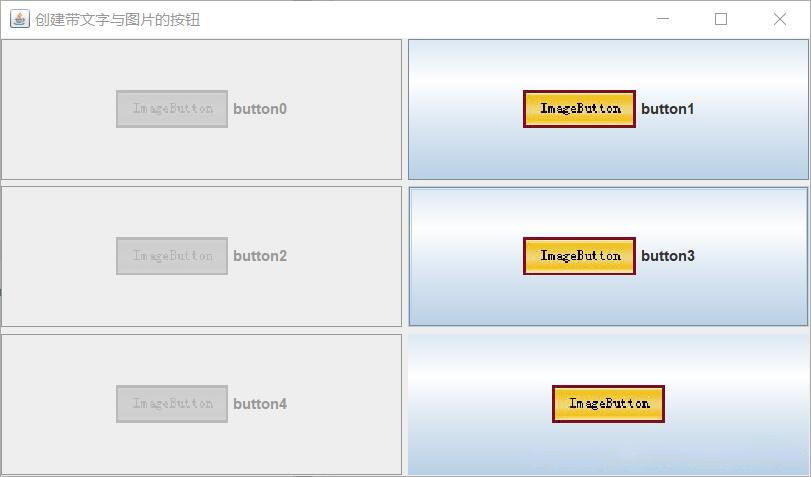
1.2 复选框组件
import java.awt.*;
import java.awt.event.*;
import javax.swing.*;
public class CheckBoxTest extends JFrame {
/**
*
*/
private static final long serialVersionUID = 1L;
private JPanel panel1 = new JPanel();
private JPanel panel2 = new JPanel();
private JTextArea jt = new JTextArea(3, 10);
private JCheckBox jc1 = new JCheckBox("1");
private JCheckBox jc2 = new JCheckBox("2");
private JCheckBox jc3 = new JCheckBox("3");
public CheckBoxTest() {
Container c = getContentPane();
c.setLayout(new BorderLayout());
c.add(panel1, BorderLayout.NORTH);
final JScrollPane scrollPane = new JScrollPane(jt);
panel1.add(scrollPane);
c.add(panel2, BorderLayout.SOUTH);
panel2.add(jc1);
jc1.addActionListener(new ActionListener() {
public void actionPerformed(ActionEvent e) {
if (jc1.isSelected())
jt.append("复选框1被选中
");
}
});
panel2.add(jc2);
jc2.addActionListener(new ActionListener() {
public void actionPerformed(ActionEvent e) {
if (jc2.isSelected())
jt.append("复选框2被选中
");
}
});
panel2.add(jc3);
jc3.addActionListener(new ActionListener() {
public void actionPerformed(ActionEvent e) {
if (jc3.isSelected())
jt.append("复选框3被选中
");
}
});
setSize(200, 160);
setVisible(true);
setTitle("复选框的使用");
setDefaultCloseOperation(WindowConstants.EXIT_ON_CLOSE);
}
public static void main(String[] args) {
new CheckBoxTest();
}
}
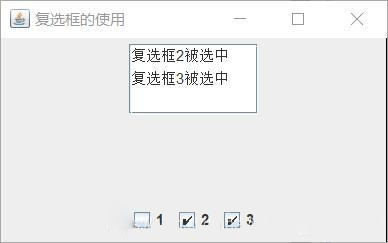
二、列表组件
2.1 JComboBox类
import java.awt.*;
import javax.swing.*;
public class JComboBoxModelTest extends JFrame {
private static final long serialVersionUID = 1L;
JComboBox<String> jc = new JComboBox<>(new MyComboBox());
JLabel jl = new JLabel("请选择证件");
public JComboBoxModelTest() {
setSize(new Dimension(160, 180));
setVisible(true);
setTitle("在窗口中设置下拉列表框");
setDefaultCloseOperation(WindowConstants.DISPOSE_ON_CLOSE);
Container cp = getContentPane();
cp.setLayout(new FlowLayout());
cp.add(jl);
cp.add(jc);
}
public static void main(String[] args) {
new JComboBoxModelTest();
}
}
class MyComboBox extends AbstractListModel<String> implements ComboBoxModel<String> {
/**
*
*/
private static final long serialVersionUID = 1L;
String selecteditem = null;
String[] test = { "身份证", "军人证", "学生证", "工作证" };
public String getElementAt(int index) {
return test[index];
}
public int getSize() {
return test.length;
}
public void setSelectedItem(Object item) {
selecteditem = (String) item;
}
public Object getSelectedItem() {
return selecteditem;
}
public int getIndex() {
for (int i = 0; i < test.length; i++) {
if (test[i].equals(getSelectedItem()))
return i;
}
return 0;
}
}
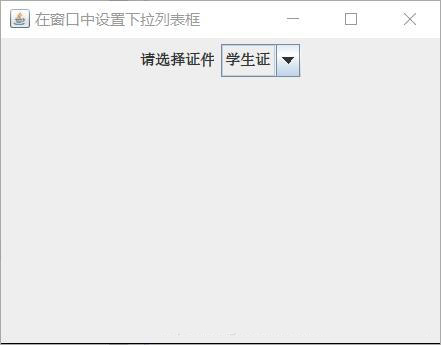
2.2 列表框组件
import java.awt.*;
import javax.swing.*;
public class JListTest extends JFrame {
/**
*
*/
private static final long serialVersionUID = 1L;
public JListTest() {
Container cp = getContentPane();
cp.setLayout(null);
JList<String> jl = new JList<>(new MyListModel());
JScrollPane js = new JScrollPane(jl);
js.setBounds(10, 10, 100, 100);
cp.add(js);
setTitle("在这个窗体中使用了列表框");
setSize(200, 150);
setVisible(true);
setDefaultCloseOperation(WindowConstants.DISPOSE_ON_CLOSE);
}
public static void main(String args[]) {
new JListTest();
}
}
class MyListModel extends AbstractListModel<String> {
/**
*
*/
private static final long serialVersionUID = 1L;
private String[] contents = { "列表1", "列表2", "列表3", "列表4", "列表5", "列表6" };
public String getElementAt(int x) {
if (x < contents.length)
return contents[x++];
else
return null;
}
public int getSize() {
return contents.length;
}
}

三、文本组件
3.1 文本框组件
import java.awt.*;
import java.awt.event.*;
import javax.swing.*;
public class JTextFieldTest extends JFrame {
/**
*
*/
private static final long serialVersionUID = 1L;
public JTextFieldTest() {
setSize(250, 100);
setDefaultCloseOperation(WindowConstants.DISPOSE_ON_CLOSE);
Container cp = getContentPane();
getContentPane().setLayout(new FlowLayout());
final JTextField jt = new JTextField("aaa", 20);
final JButton jb = new JButton("清除");
cp.add(jt);
cp.add(jb);
jt.addActionListener(new ActionListener() {
public void actionPerformed(ActionEvent arg0) {
// TODO 自动生成方法存根
jt.setText("触发事件");
}
});
jb.addActionListener(new ActionListener() {
public void actionPerformed(ActionEvent arg0) {
jt.setText("");
jt.requestFocus();
}
});
setVisible(true);
}
public static void main(String[] args) {
new JTextFieldTest();
}
}
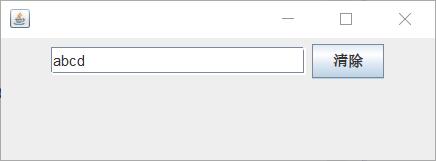
3.2 密码框
import java.awt.*;
import java.awt.event.*;
import javax.swing.*;
public class JTextFieldTest extends JFrame {
/**
*
*/
private static final long serialVersionUID = 1L;
public JTextFieldTest() {
setSize(250, 100);
setDefaultCloseOperation(WindowConstants.DISPOSE_ON_CLOSE);
Container cp = getContentPane();
getContentPane().setLayout(new FlowLayout());
// final JTextField jt=new JTextField("aaa",20);
JPasswordField jp = new JPasswordField("", 20);
jp.setEchoChar('*');
final JButton jb = new JButton("清除");
cp.add(jp);
cp.add(jb);
jp.addActionListener(new ActionListener() {
public void actionPerformed(ActionEvent arg0) {
// TODO 自动生成方法存根
jp.setText("触发事件");
}
});
jb.addActionListener(new ActionListener() {
public void actionPerformed(ActionEvent arg0) {
jp.setText("");
jp.requestFocus();
}
});
setVisible(true);
}
public static void main(String[] args) {
new JTextFieldTest();
}
}
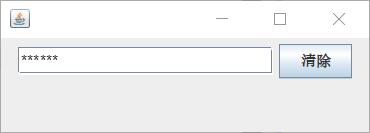
3.3 文本域组件
import java.awt.*;
import javax.swing.*;
public class JTextAreaTest extends JFrame {
public JTextAreaTest() {
setSize(200, 100);
setTitle("定义自动换行的文本域");
setDefaultCloseOperation(WindowConstants.EXIT_ON_CLOSE);
Container cp = getContentPane();
JTextArea jt = new JTextArea("文本域", 6, 6);
jt.setLineWrap(true);
cp.add(jt);
setVisible(true);
}
public static void main(String[] args) {
new JTextAreaTest();
}
}
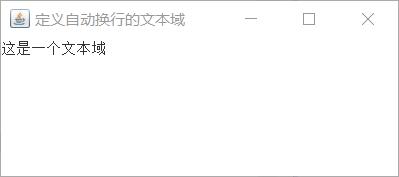
四、常用时间监听器
4.1 动作事件监听器
import java.awt.*;
import java.awt.event.*;
import javax.swing.*;
public class SimpleEvent extends JFrame {
/**
*
*/
private static final long serialVersionUID = 1L;
private JButton jb = new JButton("我是按钮,点击我");
public SimpleEvent() {
setLayout(null);
setSize(200, 100);
setDefaultCloseOperation(WindowConstants.DISPOSE_ON_CLOSE);
Container cp = getContentPane();
cp.add(jb);
jb.setBounds(10, 10, 100, 30);
jb.addActionListener(new jbAction());
setVisible(true);
}
class jbAction implements ActionListener {
public void actionPerformed(ActionEvent arg0) {
jb.setText("我被单击了");
}
}
public static void main(String[] args) {
new SimpleEvent();
}
}
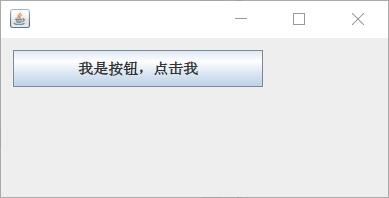
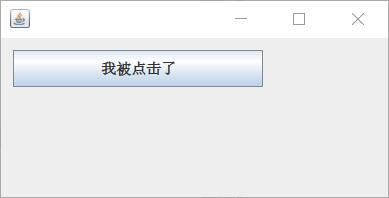
4.2 焦点事件监听器
import java.awt.*;
import java.awt.event.*;
import javax.swing.*;
public class FocusEventTest extends JFrame {
/**
*
*/
private static final long serialVersionUID = 1L;
public FocusEventTest() {
setSize(250, 100);
setDefaultCloseOperation(WindowConstants.EXIT_ON_CLOSE);
Container cp = getContentPane();
getContentPane().setLayout(new FlowLayout());
final JLabel label = new JLabel();
getContentPane().add(label);
JTextField jt = new JTextField("请单击其他文本框", 10);
JTextField jt2 = new JTextField("请单击我", 10);
cp.add(jt);
cp.add(jt2);
jt.addFocusListener(new FocusListener() {
// 组件失去焦点时调用的方法
public void focusLost(FocusEvent arg0) {
JOptionPane.showMessageDialog(null, "文本框失去焦点");
}
// 组件获取键盘焦点时调用的方法
public void focusGained(FocusEvent arg0) {
}
});
setVisible(true);
}
public static void main(String[] args) {
new FocusEventTest();
}
}
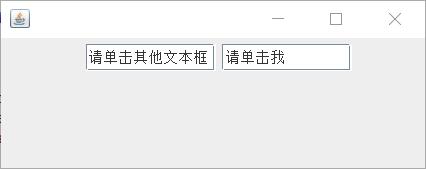
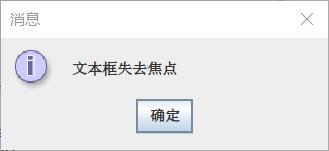
到此这篇关于使用 Java 中的 Swing 工具包实现程序界面的简单设计的文章就介绍到这了,想要了解更多相关 Java Swing 程序界面设计的其他内容请搜索W3Cschool以前的文章或继续浏览下面的相关文章,也希望大家以后多多支持!